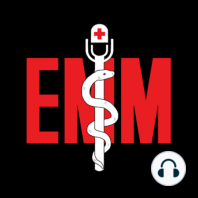5 min listen

Episode 870: Advanced Trauma Life Support (ATLS)
Episode 870: Advanced Trauma Life Support (ATLS)
ratings:
Length:
7 minutes
Released:
Sep 25, 2023
Format:
Podcast episode
Description
Contributor: Meghan Hurley MD Educational Pearls: What is ATLS? Advanced Trauma Life Support (ATLS) is a systematic and comprehensive approach to the evaluation and management of trauma patients It was developed by the American College of Surgeons (ACS) The key components include the Primary Survey ("ABCDE"), the Secondary Survey, Definitive Care, and Special Considerations What are the issues with ATLS? ATLS relies on many algorithms and rules-of-thumb, which might be helpful for individuals with basic skills and training but might actually present obstacles for those with higher levels of training. Dr. Hurley cites several examples. Example 1: ABC approach to trauma patients ABC stands for Airway, Breathing, and Circulation but focusing on the airway first is not always the best decision. Immediate attention may need to be applied to massive hemorrhage. Intubating a patient that is hemodynamically unstable may cause cardiac arrest. A more helpful phrase might be “Resuscitate before you intubate.” Example 2: C-spine precautions Cervical collars may impede the likelihood of first-pass success when intubating. The risk of complications from a failed airway may often outweigh the risk of causing a spinal cord injury. Example 3:Cutting clothes off. The E of ABCDE stands for exposure which means fully undressing the patient to look for missing injuries. This often involves cutting their clothes off. This practice might be too broadly applied and leave low-risk trauma patients without any clothes to wear when discharged home. Example 4: Digital rectal exam A rectal exam can be a useful tool in the evaluation of patients with abdominal or pelvic injuries. It can help screen for rectal bleeding, pelvic fractures, and neurological function However, the rectal exam is not a sensitive test. A retrospective study from the Indian Journal of Surgery found that a rectal exam missed 100% of urethra injuries, 92% of spinal cord injuries, 93% of small bowel injuries, 100% of colon injuries, and 67% of rectal injuries in trauma patients. Example 6: Pushing on pelvis for pelvic injuries Pushing on the pelvis to check for instability can cause further damage to an unstable pelvis. Imaging the pelvis is far more important than pressing on it if a pelvic fracture is suspected. Example 7: FAST exam A FAST exam, which stands for "Focused Assessment with Sonography for Trauma," is a rapid ultrasound examination used to assess trauma patients for signs of internal bleeding or organ damage in the abdomen and chest. These can be very useful as an initial test to tell a trauma surgeon where to start looking for internal bleeding in an unstable blunt traumatic injury If a patient is stable and likely going to get a CT scan whether the FAST is positive or negative then the test is unnecessary References ATLS Subcommittee; American College of Surgeons’ Committee on Trauma; International ATLS working group. Advanced trauma life support (ATLS®): the ninth edition. J Trauma Acute Care Surg. 2013 May;74(5):1363-6. doi: 10.1097/TA.0b013e31828b82f5. PMID: 23609291. Bloom BA, Gibbons RC. Focused Assessment With Sonography for Trauma. 2023 Jul 24. In: StatPearls [Internet]. Treasure Island (FL): StatPearls Publishing; 2023 Jan–. PMID: 29261902. Brown R. Oxygenate and Resuscitate Before You Intubate. Common pitfalls to avoid when managing the crashing airway. EMS World. 2016 Jan;45(1):48-50, 52, 54-5. PMID: 26852546. Chrimes N, Marshall SD. Attempt XYZ: airway management at the opposite end of the alphabet. Anaesthesia. 2018 Dec;73(12):1464-1468. doi: 10.1111/anae.14361. Epub 2018 Jul 11. PMID: 29998563. Docimo S Jr, Diggs L, Crankshaw L, Lee Y, Vinces F. No Evidence Supporting the Routine Use of Digital Rectal Examinations in Trauma Patients. Indian J Surg. 2015 Aug;77(4):265-9. doi: 10.1007/s12262-015-1283-y. Epub 2015 May 19. PMID: 26702232; PMCID: PMC4688269. Groeneveld A, McKenzie ML, Williams D. Log
Released:
Sep 25, 2023
Format:
Podcast episode
Titles in the series (100)
Priapism Management: A hard subject to discuss. by Emergency Medical Minute